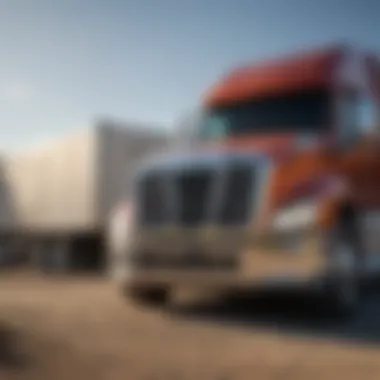Freightliner's Role in Mississippi's Transport Evolution


Intro
Freightliner has held a significant place within the Mississippi transportation landscape, particularly in relation to agricultural logistics. As one of the dominant players in the trucking industry, Freightliner has adapted its services and technology to meet the specific needs of farmers and local businesses. This article will explore the influence of Freightliner on the state's economy and its particular relevance to agricultural practices.
From innovations in trucking technology to sustainable practices, understanding Freightliner can help stakeholders make informed decisions to enhance operational efficiency. This examination will cover various aspects, including historical context, recent trends, and practical applications relevant to the agricultural sector in Mississippi.
Key Concepts and Terminology
Basic Definitions
To fully appreciate Freightliner's impact, it's crucial to understand some key terms:
- Freightliner: A well-known manufacturer of medium and heavy-duty trucks, primarily serving the North American market. Their trucks are often used for transporting agricultural products.
- Logistics: The planning, implementation, and control of the flow of goods and services from origin to consumption.
- Sustainability: The ability to meet current needs without compromising future generations, particularly concerning environmental and economic factors.
Historical Context
Freightliner's inception dates back to 1942 when it was established in Portland, Oregon. Over the decades, it expanded and carved out a significant niche in the trucking industry. The expansion into markets like Mississippi was timely, especially given the state's reliance on agriculture. Freightliner trucks have played a pivotal role in transporting cotton, soybeans, and other agricultural products to markets across the region.
As the agricultural sector in Mississippi evolved, so did Freightliner's offerings. The company has consistently innovated to suit the changing dynamics of the industry, ensuring that farmers can move their products efficiently while minimizing environmental impact.
"The transportation of goods is as necessary as the cultivation itself. Freightliner has revolutionized the way we think about logistics in agriculture."
Recent Innovations and Trends
Technological Advancements
In the realm of trucking technology, Freightliner has been at the forefront. Key advancements include:
- Telematics: Modern Freightliner trucks come equipped with telematics systems that provide real-time data on vehicle performance. This allows companies to monitor fuel efficiency and driving patterns.
- Automated Driving Systems: Innovations such as lane assist and adaptive cruise control enhance driver safety and efficiency on long-haul trips common in agricultural transportation.
Sustainable Practices
Sustainability remains a core focus amidst growing environmental concerns. Freightliner is implementing several practices to address these issues, such as:
- Alternative Fuel Options: The introduction of natural gas vehicles, which produce fewer emissions than their diesel counterparts.
- Fuel Efficiency Technologies: Advanced aerodynamics and lightweight materials contribute to better fuel consumption, crucial for cost savings in the agricultural supply chain.
Practical Applications and Techniques
Step-by-step Guides
For farmers and logistics managers, understanding how to utilize Freightliner’s technology in practice can foster greater efficiency. Here’s a simple outline of steps to consider:
- Evaluate Your Needs: Determine the type and volume of goods needing transport.
- Select the Right Truck Model: Choose a Freightliner model based on load capacity and distance.
- Incorporate Telematics: Use available data to optimize routing and reduce operational costs.
- Explore Sustainable Options: Consider alternatives like natural gas trucks to minimize environmental impact.
Case Studies
Several Mississippi-based operations have successfully integrated Freightliner trucks into their logistics. One such case involves a local soybean farm that adopted telematics, leading to a significant reduction in fuel costs and enhanced delivery times. This transition not only improved profitability but also aligned with the farmers’ sustainability goals.
The End
Understanding Freightliner's influence in Mississippi's transportation landscape reveals the intertwining of agricultural efficiency and technological progress. By embracing innovations while remaining attentive to sustainability, Freightliner stands as a key player in supporting the region’s agricultural backbone. As the industry evolves, continuing to explore these themes will be crucial for long-term success.
Intro to Freightliner in Mississippi
Freightliner plays a vital role in the transportation sector of Mississippi. It serves as a crucial element in the state’s logistics and agriculture industries. This section provides a detailed overview of Freightliner itself and the specific role it plays in Mississippi's transportation landscape. This understanding offers insight into how Freightliner influences not only transportation efficiency but also economic growth in the region.
Overview of Freightliner
Freightliner was founded in 1942 and has established itself as a prominent manufacturer of heavy-duty trucks. Its headquarters in Portland, Oregon, oversees several plants across the United States, including one in Saltillo, Mississippi. This facility is a significant contributor to its manufacturing output. Freightliner’s products, such as the Cascadia and the M2 Series, are crucial for transportation across various sectors, particularly agriculture.
The trucks produced are designed to meet rigorous safety and performance standards. They are known for reliability and fuel efficiency, which directly benefits businesses that depend on truck transportation. Employing modern technologies, Freightliner aims to reduce emissions and adapt to the growing demands for sustainable practices in the industry.
Role in the Transportation Sector
In Mississippi, Freightliner does more than manufacture trucks; it significantly contributes to logistics and transportation networks. The company provides vehicles that are central for distributing agricultural produce, industrial goods, and consumer products. This role is especially important given Mississippi's rich agricultural landscape, where effective transportation is key to getting goods to market.
Freightliner trucks facilitate:
- Transportation of Goods: Their vehicles move agricultural products from farms to processing facilities and retailers.
- Support for Local Businesses: Local businesses benefit from Freightliner’s reliable trucks, helping them maintain efficiency in their operations.
- Economic Growth: By creating jobs and contributing to the supply chain, Freightliner supports the overall economy of Mississippi.
"The success of Mississippi's transportation relies greatly on companies like Freightliner. Their impact is seen across various sectors, especially agriculture," says a local logistics manager.
Understanding how Freightliner operates and the importance of its role in Mississippi provides a foundation for exploring its historical context, economic contributions, and future directions within the state.
The Historical Context of Freightliner’s Establishment
Understanding the historical context of Freightliner's establishment is vital to appreciate its impact on Mississippi's transportation landscape. This background provides insight into the company's evolution and its significance in the local economy and agriculture. The foundation and growth of Freightliner are not just about a business; they represent pivotal developments in the trucking industry that influenced Mississippi’s infrastructure and logistic solutions for farming products.
Founding and Growth
Freightliner was founded in 1942, with the intention of producing a line of heavy-duty trucks focused on the commercial market. The company's commitment to quality and innovation positioned it as a leader in the trucking sector. Their trucks became known for performance and resilience, factors that resonated with the logistics needs of various industries, including agriculture.
From its early days, Freightliner expanded its operations significantly. The establishment of manufacturing plants in various states, including Mississippi, helped the company to not only create jobs but also enhance local economies. Over the decades, the demand for Freightliner trucks grew, paralleling the economic expansion in the agricultural sector. This growth narrative includes recruiting skilled labor, establishing a workforce that could adapt to the evolving technologies within the truck manufacturing and logistical landscapes.
The significance of Freightliner’s founding extends beyond its products. It symbolizes a shift in how goods could be transported efficiently across the region, especially for agricultural goods, which require timely and reliable delivery systems due to their perishable nature. As Freightliner continued to innovate, the impacts of its presence were felt across various dimensions of Mississippi's economy.
Key Milestones in Mississippi
In Mississippi, Freightliner’s timeline includes key milestones that have shaped its operational footprint. The opening of the manufacturing facility in 1991 in Saltillo marked a substantial expansion for the company. This facility not only contributed to creating a significant number of jobs but also strengthened the supply chain for agricultural logistics in the region.
Another important milestone was the company’s investments in upgrading technology within its facilities. Implementations of modern manufacturing techniques began in the early 2000s, making production more efficient and aligning with evolving market demands. The integration of advanced technologies also influenced truck performance, catering particularly to the agricultural industry, which relies heavily on timely deliveries.
Freightliner also has engaged closely with Mississippi’s agricultural organizations. These partnerships have led to improvements in truck design and functionality that support the specific needs of farmers. This cooperation is essential in addressing the unique logistical challenges faced by the agricultural community, such as transportation of varied sizes of harvests and seasonal peaks in demand.


"The impact of Freightliner in Mississippi has altered not only transportation efficiency but has also contributed vital support for local farmers and businesses."
Ultimately, the historical context explores how Freightliner molded Mississippi's transportation landscape from a nascent stage to a robust framework that supports agricultural logistics. The focus on growth and adaptation has allowed Freightliner to remain relevant and become an essential player in the state's economy.
Economic Contributions of Freightliner
Freightliner plays a pivotal role in Mississippi's economy, offering significant contributions that resonate throughout the local landscape. The company's influence extends beyond the trucking industry and into broader economic implications. Understanding these contributions helps to appreciate Freightliner’s comprehensive impact.
The economic contributions of Freightliner can be dissected into specific aspects that demonstrate its importance. These include job creation, workforce development, and the overall stimulus of the local economy. By fostering a stable economic environment, Freightliner transforms challenges into opportunities for growth.
Job Creation and Workforce Development
Freightliner has been instrumental in generating numerous job opportunities within Mississippi. As one of the major employers in the region, it offers a wide range of positions across various levels. This includes not just trucking jobs but also roles in management, engineering, and logistics. The presence of Freightliner attracts a skilled workforce, enhancing the local job market.
In addition, Freightliner invests significantly in workforce development. The company often collaborates with local educational institutions to create training programs. These programs are designed to equip individuals with relevant skills, preparing them for employment in the transportation sector. This partnership between Freightliner and educational entities fosters a continuous cycle of skill enhancement. Thus, employees benefit from improved training, which leads to better job performance and higher satisfaction.
"Freightliner’s role in workforce development showcases its commitment to fostering local talent and ensuring a sustainable future for the industry."
Influence on Local Businesses
Freightliner's economic impact extends to local businesses, where its operations serve as a catalyst for economic activity. Many small and medium-sized enterprises around Freightliner’s operations depend on the logistics and transportation services the company provides. They benefit from enhanced trade opportunities, resulting in stronger sales and growth prospects.
In particular, agricultural businesses gain considerable advantages from Freightliner's logistics capabilities. The streamlined transportation of products ensures that goods reach their markets efficiently and timely. This effectiveness enhances the competitiveness of local farms and agricultural businesses, ultimately benefiting consumers.
As Freightliner continues to thrive, the surrounding businesses often see a direct correlation to their own success. Therefore, the influence of Freightliner on this interconnected ecosystem cannot be overstated, establishing a foundation for economic resilience in Mississippi.
Freightliner’s Role in Agricultural Logistics
Freightliner significantly shapes agricultural logistics in Mississippi by providing efficient transportation solutions for local farmers and agricultural businesses. The agriculture sector within the state relies heavily on timely and safe delivery of goods. Freightliner’s network of trucks ensures that agricultural products reach their destinations quickly and efficiently. This reliable transport is vital for the perishable nature of many agricultural products, which require careful handling.
Transportation of Agricultural Goods
The logistics of hauling agricultural goods is a complex task. Freightliners are designed to cater to these needs with a variety of vehicle types. From refrigerated trailers for sensitive items like fruits and vegetables to flatbeds for bulk commodities, the flexibility of their fleet supports diverse agricultural needs. This variety enhances the capacity to serve different markets, whether local or national.
Additionally, Freightliner employs advanced technologies such as GPS and route optimization software. This technology minimizes delays, ensuring products are transported under optimal conditions. By utilizing data analytics, they monitor traffic patterns and weather conditions. Such proactive measures mitigate risks associated with spoilage and damage, directly benefiting farmers in Mississippi.
Supporting Local Farmers
Freightliner's contribution does not stop at mere transportation. By fostering relationships with local farmers, they provide essential support that helps farmers scale operations. Access to reliable transportation translates to increased market reach for agricultural products. Farmers can introduce their goods to distant markets, which could lead to better pricing and sales opportunities.
Furthermore, Freightliner invests in community engagement initiatives. They offer training programs to improve drivers' understanding of agricultural transportation requirements. This education allows for better handling of goods, aligning with safety and quality standards crucial for agricultural markets. Local farmers particularly appreciate this focus on skill development, as it leads to an improved partnership in the logistics chain.
"Reliable transport is key to ensuring agricultural products reach consumers without compromise, and Freightliner stands at the forefront of this challenge."
Their impact on the local landscape is profound, maintaining the crucial balance between production and market availability.
Advancements in Trucking Technology
Freightliner is recognized for its continual evolution in truck design and functionality. As a pivotal player in the transportation sector, the importance of advancements in trucking technology cannot be overstated. These innovations not only boost operational efficiency but also significantly impact safety standards, environmental considerations, and overall effectiveness in logistics. Understanding these advancements reveals how Freightliner remains a key contributor to Mississippi’s transportation landscape.
Evolution of Freightliner’s Trucks
Freightliner’s trucks have transformed through the decades, adapting to changing industry demands and consumer needs. The introduction of more powerful engines and superior transmission systems has been critical. Modern Freightliner models, such as the Cascadia, showcase advancements in fuel efficiency and aerodynamics. For instance, the Cascadia features designs that reduce drag, enabling better fuel consumption and lower carbon emissions.
The integration of smart technologies has also been vital. Most recent models are equipped with advanced driver-assistance systems, which enhance safety and prevent accidents on the road. These include features like lane departure warnings and adaptive cruise control. Such advancements ensure that Freightliner’s trucks are not only reliable but also smart, aligning with modern safety expectations.
"The continuous development of Freightliner’s trucks is a testament to innovation in the transport sector, adhering to the pressing demands for sustainability and efficiency."
Additionally, Freightliner’s commitment to improving payload capacity and reducing weight through advanced materials is notable. This development allows farmers and distribution companies to transport goods more effectively by maximizing payloads while minimizing the number of trips required.
Incorporation of Sustainable Practices
Sustainability has emerged as a non-negotiable consideration in today's transportation industry. Freightliner has taken this challenge seriously, increasingly integrating sustainable practices into its operations. This shift is not merely a trend but a necessary evolution in response to both regulatory demands and consumer expectations.
One significant effort includes the adoption of alternative fuels. Freightliner has incorporated options for diesel-electric hybrids and natural gas vehicles, which contribute to lower emissions. Moreover, freight companies in Mississippi utilizing these technologies benefit from reduced operational costs due to decreases in fuel consumption.
Another key aspect is the focus on recycling and reusability in manufacturing. Freightliner aims to minimize waste in its production processes. Utilizing recycled materials in truck components not only decreases environmental impact but also supports the local economy through sustainable sourcing.
The integration of technology plays a substantial role in enhancing sustainability. Data-driven insights help logistics managers optimize routes, thereby reducing carbon footprints during transport. This mirrors the larger trend toward using technology as a tool for sustainable growth in the transport sector.
Regulatory Challenges and Compliance
Regulatory compliance plays a vital role in ensuring that Freightliner operates effectively within Mississippi's transportation landscape. Understanding the array of regulations is essential for the company and the industry at large. These regulations serve to protect the environment, ensure safety, and promote fair competition. Freightliner’s adherence to these guidelines not only supports its operations but also impacts its reputation and sustainability efforts.
Freightliner faces a complex web of state and federal regulations. Non-compliance can result in significant penalties and operational disruptions. Therefore, staying abreast of the evolving legal landscape is not just a matter of legal obligation, but also strategic advantage. This is particularly relevant in areas such as labor laws, emissions standards, and safety regulations.
The benefits derived from rigorous compliance are multifaceted. On one hand, businesses can strengthen their operational frameworks, fostering a culture of safety and responsibility. On the other hand, adherence to regulations can enhance public perception and consumer trust, both critical in the transportation sector. Moreover, compliance aids in avoiding costly violations and potential litigation.
State Regulations in Mississippi
Mississippi’s regulatory framework outlines specific requirements influencing Freightliner’s operations. The state sets forth regulations that encompass various aspects, including vehicle standards, safety protocols, and local business practices. This means that Freightliner must comply not only with general trucking regulations but also with those that are unique to Mississippi.
Some regulations focus on vehicle emissions and maintenance standards, aiming to minimize environmental impact. These rules ensure that Freightliner employs trucks that operate efficiently while adhering to pollution control measures. Additionally, state regulations seek to create a safe working environment for drivers, encompassing hours of service, vehicle inspections, and training requirements.
It is essential for Freightliner to develop robust mechanisms to ensure compliance. This involves continuous training for staff and regular audits of operations to align with state mandates.
Impact of Federal Policies
Federal policies add another layer of complexity to freight operations in Mississippi. The Federal Motor Carrier Safety Administration (FMCSA) governs many regulations affecting trucking companies. These policies cover various aspects, including safety rules, operational guidelines, and labor regulations that Freightliner must incorporate into their practices.
A significant focus of federal policies is the emphasis on safety. The FMCSA establishes safety standards, including truck maintenance and driver qualifications. Regulations are in place to monitor driver behavior through hours-of-service rules which are critical in preventing fatigue.
Moreover, federal programs aimed at reducing emissions, such as the Environmental Protection Agency's regulations, directly influence Freightliner's investment in greener technologies. These policies force companies to adapt their fleets and embrace sustainable practices, aligning operational strategies with national environmental goals. Compliance with such policies can often present an initial cost but helps in long-term sustainability and market competitiveness.


In summary, both state and federal regulatory frameworks shape the operational landscape for Freightliner in Mississippi, underscoring the importance of compliance not only for legal necessities but also as a competitive strategy. Understanding these regulations will be crucial for future growth and sustainability.
Collaboration with Agricultural Organizations
The integration of Freightliner’s operations with agricultural organizations is a critical aspect of the company’s overall impact in Mississippi. This collaboration is essential as it directly influences the efficiency and productivity of local agricultural practices. The synergy between Freightliner and agricultural entities facilitates a streamlined process for transporting goods from farms to markets. This cooperation creates various advantages, which are vital to understanding how Freightliner shapes the transportation landscape in Mississippi.
Partnerships for Efficiency
Freightliner works closely with several agricultural organizations to enhance logistical operations. These partnerships focus on optimizing supply chain systems, addressing the specific needs of farmers in the region. By collaborating with local cooperatives and produce associations, Freightliner aids in developing tailored transportation solutions.
- Reduced Transportation Costs: Local farmers benefit from lower transportation costs achieved through efficient routing and scheduling.
- Improved Delivery Times: Increased coordination helps ensure that agricultural products reach the market promptly, preserving quality and freshness.
- Resource Sharing: Collaborations often include shared resources such as transportation equipment and technology, which enhance operational capacity for both parties.
This mutual benefit lays a strong foundation for fostering resilience in the agricultural sector. It not only supports local farmers but also stabilizes prices in the market, contributing to economic viability.
Community Involvement
Freightliner’s commitment to working with agricultural organizations goes beyond just logistics; it extends to community involvement initiatives. Participation in community events allows Freightliner to better understand the needs of the local agricultural sector. This engagement creates trust and transparency between freight operations and agricultural producers.
- Educational Programs: Freightliner has been known to sponsor workshops and seminars aimed at educating farmers about best practices in logistics and technology utilization.
- Local Sponsorships: Supporting local agricultural fairs and events enhances community relations and strengthens the brand’s image among farmers.
- Feedback Mechanisms: Establishing channels for feedback allows farmers to voice their challenges and needs, which Freightliner can address in future operations.
"Collaboration fosters a sense of community. When Freightliner works alongside farmers, it’s not just about logistics; it’s about building relationships that lead to shared success."
This active participation in agricultural communities holds significant relevance. It equips Freightliner with insights necessary for continuous improvement, thereby ensuring that its services evolve in parallel with the changing landscape of Mississippi's agriculture.
Future Trends in Mississippi’s Transportation Landscape
Understanding the future of Mississippi’s transportation landscape is essential for stakeholders, including agricultural producers and logistics managers. Trends in technology, infrastructure, and economic shifts can impact how efficiently goods move across the state. Freightliner plays a significant role in shaping these trends.
Emerging Technologies
The incorporation of emerging technologies is revolutionizing the transportation industry in Mississippi. Freightliner is at the forefront, adopting advancements that enhance operational efficiency. Some critical technologies include:
- Autonomous vehicles: While full autonomy is still a future prospect, technologies that assist drivers are becoming common. Features such as adaptive cruise control and lane-keeping assistance improve safety and reduce driver fatigue.
- Telematics systems: These provide real-time data on vehicle performance, allowing for proactive maintenance and better fuel efficiency. Fleet managers can optimize routes based on traffic data, which reduces delivery times.
- Blockchain technology: This could enhance transparency in the supply chain, allowing for better tracking of shipments and reducing fraud. The implementation of secure transactions will build trust among freight partners.
Emerging technologies not only improve the operations of Freightliner but also serve the agricultural sector by ensuring perishables are transported quickly and efficiently. As these technologies evolve, they are likely to have a profound impact on logistics in Mississippi.
Economic Projections
As Mississippi's transportation landscape evolves, economic projections will play a crucial role in determining future investments and growth. Analysts predict several key trends:
- Increased demand for freight transport: With the growth of e-commerce and agricultural exports, there will be a greater need for reliable freight services. This will likely lead to expansion in Freightliner’s operations within the state.
- Job creation in high-tech roles: As technology becomes more integrated into transportation, there will be a demand for skilled labor. Jobs in data analysis, maintenance, and logistics management will become prominent, requiring training programs to develop the local workforce.
- Infrastructure investments: To support growing freight needs, state and local governments may invest more in highways and ports. Improvements in infrastructure will enhance logistics efficiency, allowing Freightliner to optimize delivery routes.
The economic outlook indicates a growing interconnectivity between transportation, technology, and agriculture. Stakeholders must remain informed about these trends to make strategic decisions moving forward.
"Emerging technologies and economic projections are creating an interconnected framework that will redefine Mississippi's transportation landscape."
In summary, the future trends in Mississippi’s transportation landscape indicate a move towards smarter and more efficient systems, driven by developments in technology and a favorable economic climate. Participation from all levels of the supply chain will be necessary to adapt to these changing dynamics.
Environmental Considerations
Environmental considerations are essential when discussing Freightliner in Mississippi's transportation landscape. The significant role of the transport sector in shaping ecological practices cannot be neglected. Companies like Freightliner have a direct impact on natural resources, local air quality, and community health. Thus, it becomes vital to examine specific initiatives that aim to mitigate adverse effects while fostering sustainable operations.
Sustainability Initiatives
Freightliner has undertaken various sustainability initiatives that focus on reducing emissions and promoting efficient resource usage. These efforts are in line with regulations and the growing awareness of environmental issues. For instance, the incorporation of low-emission technologies in their trucks is crucial. These trucks usually feature advanced engines that minimize pollutants during operation. By focusing on cleaner fuels and electric options, Freightliner demonstrates a commitment to shaping a greener future in transportation.
Another notable initiative involves the adoption of recycling programs at manufacturing facilities. It significantly reduces waste and promotes the reuse of valuable materials. Such practices not only limit landfill waste but also lessen the environmental footprint of production processes. Additionally, Freightliner collaborates with local organizations to sponsor environmental clean-up campaigns within communities, enhancing both community relations and the local ecosystem.
Impact on Local Ecosystems
Understanding the impact on local ecosystems is vital. Freightliner's operations, while beneficial, can pose certain risks. The transportation of goods often leads to the exploitation of natural resources. This includes the routes trucks take and the emissions they produce. Poor management of these elements could disrupt local habitats and lead to a decline in air quality.
"Sustainable practices are not just about compliance; they are about creating a legacy for future generations."
However, it is essential to recognize that Freightliner also has opportunities to positively influence local ecosystems. Their efforts in minimizing emissions can greatly benefit air quality, particularly in industrial areas prone to pollution. Adoption of sustainable logistics practices can aid in conserving biodiversity by reducing the need for extensive resource extraction and promoting responsible land use.
Testimonials from Industry Professionals
Understanding the perspectives of industry professionals is crucial for grasping the impact of Freightliner in Mississippi's transportation sector. These testimonials provide nuanced insights into both the operational effectiveness and strategic importance of Freightliner. They offer first-hand accounts of the relationships between various stakeholders in the transportation ecosystem. It is important to examine this topic to gain better awareness of real-world experiences and the effects on logistics and agriculture.
Insights from Logistics Managers
Logistics managers play a vital role in ensuring that operations run smoothly. Their experiences reveal how Freightliner vehicles are pivotal for maintaining efficiency in the supply chain. Many managers highlight the importance of fleet reliability and how Freightliner's state-of-the-art trucks contribute to this reliability. They often mention features like advanced braking systems and fuel efficiency, which help in optimizing routes and reducing operational costs.
The importance of technology in fleet management is often stressed. Managers have pointed to how innovative technologies enhance tracking and real-time communication, allowing for better coordination. For example, integrating GPS technology has not just improved route optimization but has also enhanced safety on the roads by providing accurate traffic updates. This data-driven approach boosts productivity and leaves less room for human error, ultimately leading to higher satisfaction for both clients and drivers.
Perspectives from Local Farmers
Local farmers provide unique insights into how Freightliner’s operations affect agricultural logistics. Many farmers express appreciation for the dependability of Freightliner trucks for transporting goods. Testimonials reveal how timely deliveries can make a significant difference in preserving the quality of agricultural products. Without reliable transportation, farmers may face delays that affect their market competitiveness and profitability.
Moreover, farmers speak to the importance of Freightliner’s ability to understand the specific needs of agricultural logistics. They appreciate the trucks' capacity to handle diverse types of cargo, from grains to livestock. This adaptability supports the local agricultural economy and ensures that products reach consumers fresh and on time.
Farmers also highlight the benefits of partnerships with Freightliner, particularly in terms of community support and engagement. This involvement encourages farmers to adopt new practices and technologies that align with efficient transportation. Understanding their perspectives helps paint a holistic picture of how Freightliner influences Mississippi’s agricultural landscape and community atmosphere.
Challenges Facing Freightliner in Mississippi
Freightliner faces several challenges in Mississippi's transportation landscape. Understanding these challenges is vital for recognizing the factors that impact Freightliner's operations and its role in the local economy and agriculture sector. As the industry evolves, Freightliner must navigate increasingly competitive markets and address infrastructural constraints effectively.
Market Competition
The competition in the logistics and transportation sector in Mississippi is intense. Numerous companies vie for contracts and market prominence. This saturation raises the stakes for Freightliner as it aims to maintain and grow its market share. Competitors often innovate faster or offer alternative services that may appeal to agricultural businesses. For instance, local trucking companies might provide specific routes tailored to the needs of farmers, which can erode Freightliner's traditional customer base.
Furthermore, the presence of large national carriers who offer competitive pricing and reliable service creates an additional challenge. Local businesses might lean towards these companies, thus making it crucial for Freightliner to differentiate itself. Strategies could include enhancing customer service, incorporating innovative solutions, or offering flexible pricing models.


Freightliner's ability to adapt and respond to this competitive landscape will determine its long-term sustainability.
Infrastructure Limitations
Mississippi's transportation infrastructure presents significant limitations that impact Freightliner's operations. Many roads and bridges in the state require extensive maintenance and upgrades. These constraints can lead to delays in transportation and increased operational costs. In some scenarios, road conditions can become a barrier to timely deliveries, which is critical in agriculture logistics.
Moreover, the layout of transportation networks can complicate logistics. Limited access points to agricultural hubs may hinder efficient movement of products. This situation often results in longer travel times and additional fuel consumption.
Here are some critical considerations regarding infrastructure limitations:
- Road Conditions: Poorly maintained roads may affect the safety and efficiency of Freightliner’s fleet.
- Access to Ports: Limited accessibility to shipping ports may hinder the export of agricultural goods.
- Intermodal Connectivity: Challenges in making seamless transitions between different modes of transport can add complexity to logistic operations.
Addressing these infrastructure challenges requires collaboration with state agencies and investment in improvements. This collaboration can help create a more favorable operational environment and enhance Freightliner’s service capabilities.
Case Studies: Successful Freightliner Operations
The examination of successful Freightliner operations in Mississippi provides valuable insights into the effectiveness and adaptability of the company within the local transportation landscape. These case studies illustrate the practical impact of Freightliner's logistics expertise on various sectors, particularly agriculture. Understanding these successful operations highlights not only the achievements in efficiency and technology but also the tangible benefits that flow to local communities.
Local Success Stories
Freightliner's influence can be distinctly observed through various local success stories, which serve as a testament to the brand's commitment to enhancing transportation. These stories often center around specific farms or agribusinesses that have partnered with Freightliner for logistical support.
For instance, a grain producer in the Delta region benefited significantly from Freightliner's specialized trucks designed for transporting bulk products. The producer reported a notable increase in the rate of deliveries, which enabled them to meet seasonal demands more reliably.
The tailored logistical solutions provided by Freightliner have allowed local businesses to receive goods more swiftly, cutting down operation costs. This has resulted in a more competitive edge for these businesses in the marketplace. Some farmers have even noted that their collaboration with Freightliner has allowed them to expand their markets, reaching customers that were previously unreachable due to transportation limitations.
Innovative Logistics Solutions
Freightliner has continually innovated to meet the unique needs of Mississippi’s agricultural landscape. By integrating advanced logistics solutions, the company enhances overall operational efficiency for its clients.
One example is the implementation of real-time tracking systems, which has transformed how goods are transported. With this technology, farmers and producers can monitor their shipments at every stage. This tracking capability decreases uncertainties and increases transparency in the supply chain.
Freightliner has also adopted flexible delivery schedules, accommodating the varying needs of agribusiness clients. This level of adaptability fosters stronger partnerships between Freightliner and local farmers. For many, this is not just about transportation; it’s about collaboration to achieve shared goals in a highly competitive environment.
Overall, the case studies of Freightliner operations emphasize not only the technical advancements in logistics but also the significance of local partnerships. Each success story contributes to a broader understanding of how effective transportation networks can empower agricultural sectors in Mississippi.
Freightliner’s Community Impact
Freightliner plays a vital role in enhancing community welfare in Mississippi. The company recognizes that its influence extends beyond the transportation sector. By integrating corporate social responsibility with local engagement initiatives, Freightliner becomes a vehicle for change and improvement within communities. This commitment not only strengthens its brand but also deeply embeds it in the socio-economic landscape of Mississippi.
Corporate Social Responsibility Initiatives
Freightliner has well-defined corporate social responsibility initiatives aimed at fostering community development. These efforts focus on several key areas:
- Economic Empowerment: Freightliner funds local businesses, creating partnerships that stimulate economic growth. This helps small enterprises thrive, which is particularly important in regions dependent on agriculture.
- Environmental Sustainability: The company invests in programs that promote sustainability. For example, they engage in tree-planting efforts and support waste reduction initiatives, demonstrating a commitment to environmental stewardship.
- Health and Safety Programs: Freightliner supports health initiatives that improve community well-being. These programs often include workshops on health awareness and access to medical resources.
Freightliner's efforts show that its impact on Mississippi extends beyond logistics. By contributing to the welfare of communities, they provide a framework of responsibility that other companies might aspire to emulate.
Engagement with Local Schools
Education is another significant focus for Freightliner. Their engagement with local schools is crucial in fostering a future generation equipped with knowledge and skills necessary in the transportation sector. Some key points include:
- Educational Partnerships: Freightliner collaborates with schools to create programs that introduce students to careers in logistics and transportation. This provides insights into the industry and allows students to explore potential career paths.
- Skills Training: The company often organizes workshops and seminars aimed at high school students. Such sessions cover vital topics, including engineering and sustainability practices within freight operations.
- Scholarships and Internships: Freightliner offers scholarships to deserving students pursuing careers in related fields. Internships with Freightliner give students practical experience, bridging the gap between education and employment.
"Engaging with local schools not only builds a talent pipeline for the future but also strengthens community bonds."
Through these educational initiatives, Freightliner aims to empower young individuals by directing them toward sustainable careers in the transportation industry. The provision of opportunities underscores Freightliner's role as a committed community partner, making a difference in Mississippi's local landscape.
Role of Technology in Enhancing Operations
The integration of technology within Freightliner’s operations cannot be understated. It has played a pivotal role in optimizing processes, improving efficiency, and ensuring responsiveness to market needs. The advancements in technology particularly influence fleet management and logistical strategies, which are essential components in the transport landscape of Mississippi.
Data Analytics in Fleet Management
Data analytics has emerged as a cornerstone in the management of Freightliner’s fleet. By harnessing large volumes of data, Freightliner can analyze patterns related to vehicle performance, fuel consumption, and maintenance needs. This analytical approach enables managers to make informed decisions that enhance operational efficiency. For instance, predictive analytics can forecast when a vehicle requires servicing.
Benefits of utilizing data analytics include:
- Reduced Downtime: Timely maintenance reduces unexpected breakdowns.
- Cost Savings: Understanding fuel efficiency can lead to reduced operational costs.
- Enhanced Decision Making: Real-time data allows for responsive adjustments in fleet operations.
Remote telematics is one of the tools that Freightliner employs to leverage data. It provides insights into vehicle diagnostics, driver behavior, and route performance. This not only enhances operational performance but also improves resource allocation.
GPS and Route Optimization
The use of GPS technology represents a significant advancement in how Freightliner optimizes routes for its transportation services. Efficient route planning is vital, especially in a state like Mississippi where agricultural logistics may require specific considerations due to seasonal factors.
GPS technology supports operations by:
- Real-Time Tracking: Allows for monitoring trucks and assets throughout their journey.
- Traffic Management: Provides updates on traffic conditions to avoid delays.
- Route Efficiency: Algorithms suggest the fastest routes based on current conditions, ultimately saving time and fuel.
"The efficiency gained from GPS and data analytics ensures that our fleet operates with peak precision, aligning our operations with the needs of local farmers and businesses."
End: The Future of Freightliner and Mississippi’s Transport Landscape
Freightliner plays a dominant role in shaping Mississippi's transportation dynamics, especially in the agricultural sector. The continuation of its impact relies on several factors that will dictate the future of both the company and the local transport landscape. The emphasis on technological advancements, sustainable practices, and ongoing community engagement are vital areas of focus. As Freightliner adapts to changing market conditions and regulatory environments, it must maintain a clear view on innovation and adaptation. The trends identified throughout this article reveal not only the challenges faced but also the profound opportunities for growth and improvement that Freightliner can pursue in Mississippi.
Summary of Findings
This article explored Freightliner’s significant contributions to Mississippi's transportation sector. The key findings include:
- Historical Significance: Freightliner has a well-documented establishment in Mississippi which provides a robust framework for its operations today.
- Economic Impact: The company's operations have led to substantial job creation and development of the local workforce.
- Technological Innovations: Advancements in trucking technology have enhanced efficiency in logistics, making operations smoother for both Freightliner and their clients in agriculture.
- Community Engagement: Ongoing corporate social responsibility programs have solidified the company's standing within the community.
Through these findings, it is clear that Freightliner is not merely a transportation company; it is a vital participant in the economic and social fabric of Mississippi.
Final Thoughts on Sustainability and Growth
As the world shifts toward more sustainable practices, Freightliner has the opportunity to lead the way. The integration of greener technologies in fleet operations will be essential for ensuring ongoing relevance in an evolving market. Furthermore, embracing sustainable logistics not only responds to consumer demand but also aligns with broader environmental goals. It is important for the company to cultivate a growth model that does not sacrifice environmental health for economic gain. By investing in innovative and sustainable practices, Freightliner can secure its position not just in Mississippi, but as a leader in the freight industry.
"The future of transportation success in Mississippi hinges on balancing economic growth with sustainable practices and technology-driven innovation."
In summation, Freightliner’s future in Mississippi’s transportation landscape is promising yet demands vigilance in keeping pace with industry changes and community needs. Continuing to invest in sustainability will not only be beneficial for the local environment but ultimately advantageous for business growth.















